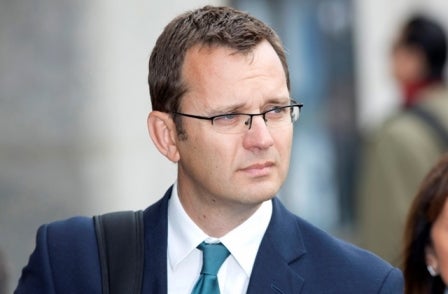
Former News of the World editor Andy Coulson has described his shock at the arrest of one of his reporters for phone-hacking, and denied suggestions that he was involved in a cover-up.
During a fifth day in the witness box, the ex-No 10 spin doctor (pictured above – Reuters) described what happened after News of the World royal editor Clive Goodman was held and police swooped on his newsroom on 8 August, 2006.
The jury at the Old Bailey has heard that Goodman and private investigator Glenn Mulcaire were convicted of hacking voicemails later that year.
Coulson, 46, resigned as News of the World editor in 2007.
Earlier in the trial, Goodman, 56, said Coulson had put pressure on him to plead guilty to phone-hacking and to say he had been a "lone wolf".
But today Coulson denied the accusation, and said he had acted under his duty of care to an employee.
On the arrest, he said: "It was quite shocking to have police on the floor. It was very shocking and I wanted to make sure that the right things were being done from the paper's perspective."
Coulson said it was not his job to launch an investigation himself. And, while he did not hinder the police probe, he did not volunteer information either.
As Goodman was being interviewed by police, he spoke to media mogul Rupert Murdoch and a News International lawyer.
Murdoch was "concerned", Coulson said, adding: "He said the most valuable thing a newspaper has is the trust of its readers, and that's something that stayed in my mind."
He said the NI lawyer was "shocked" that a law designed to combat terrorism had been used against a reporter.
He told jurors: "Of course until that point nobody had any idea voicemail interception was illegal.
"He made reference to the point of law that makes voicemail interception illegal.
"He said the law that was apparently broken… was a piece of legislation to catch terrorists and he was shocked that this had happened."
Coulson said that he thought at the time that Goodman's arrest spelled the end of his life as a "front-line reporter" but not necessarily of his entire career.
He phoned Goodman two days after his arrest to tell him that he had been suspended and his legal fees would be paid.
Coulson said: "I never told him he should plead guilty, nor did I tell him not to plead guilty."
The two men met at Cafe Rouge in Wimbledon on 14 August, 2006, Coulson said, adding: "I told him my view was this did not have to mean the end of his professional life as a journalist."
Coulson said he did tell Goodman that he had "gone off the reservation", adding: "I think it's an accurate description of how I felt Clive had behaved. I knew enough to know he had gone behind my back."
But he denied describing Goodman as a "lone wolf" or suggesting that he could use his influence in the case.
Coulson told his lawyer, Timothy Langdale QC: "The anti-terrorist police had come on to the newsroom floor. I had a reporter charged. It was a major crisis for the paper. I was feeling many things but I was not being influential, put it that way."
Coulson said he asked an executive if hacking had been involved in producing tapes he had heard two years earlier which revealed then home secretary David Blunkett's affair with Spectator publisher Kimblerly Quinn.
He said: "I asked quite soon after Clive Goodman had been arrested and released and we knew the identity of Glenn Mulcaire and Nine Consultancy.
"I asked if Nine Consultancy had been involved in the Blunkett story in any way and the answer came back 'No'."
Coulson, of Charing, Kent, denies conspiring to hack phones and commit misconduct in a public office. All seven defendants deny the charges against them.
Email pged@pressgazette.co.uk to point out mistakes, provide story tips or send in a letter for publication on our "Letters Page" blog
